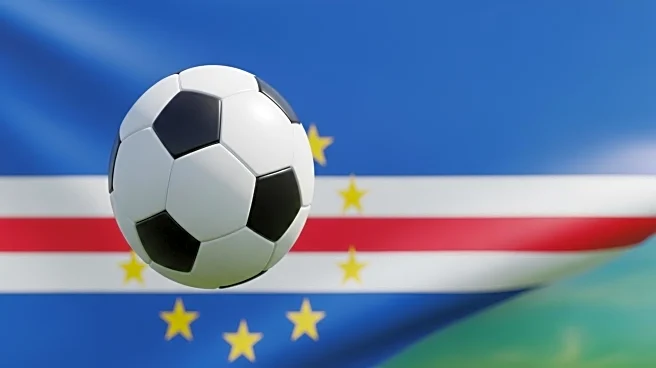What's Happening?
Cape Verde has made history by qualifying for the FIFA World Cup 2026, marking its first appearance in the prestigious tournament. The island nation, located off the west coast of Africa, secured its spot by defeating Eswatini 3-0. The victory was achieved with goals from Willy Semedo, Rocha Livramento, and Stopira. Cape Verde topped Group D with 23 points, surpassing Cameroon, which has the African record for World Cup appearances. Cameroon drew with Angola and will now attempt to qualify through the playoffs. Cape Verde becomes the second smallest nation to qualify for the World Cup, following Iceland's debut in 2018.
Why It's Important?
Cape Verde's qualification for the World Cup is significant as it highlights the growing competitiveness and development of football in smaller nations. This achievement could inspire other small countries to invest in sports infrastructure and talent development. For Cape Verde, participating in the World Cup offers an opportunity to showcase its culture and talent on a global stage, potentially boosting tourism and international interest. The event also underscores the unpredictable nature of sports, where underdog teams can achieve remarkable success, challenging traditional powerhouses in international competitions.
What's Next?
As Cape Verde prepares for its World Cup debut, the nation will likely focus on strengthening its team and strategy to compete against more experienced teams. The qualification could lead to increased investment in sports facilities and youth programs, aiming to sustain and build upon this success. Other African nations, like Cameroon, will continue their efforts to secure a place in the tournament through the playoffs, adding to the competitive dynamics of the qualification process. The global football community will watch closely to see how Cape Verde performs on the world stage.
Beyond the Headlines
Cape Verde's World Cup qualification may have broader implications for the representation of smaller nations in international sports. It could encourage FIFA and other sports organizations to consider more inclusive policies that support the participation of diverse countries. Additionally, this achievement might influence cultural exchanges and diplomatic relations, as sports often serve as a bridge between nations. The success story of Cape Verde could also inspire narratives around resilience and determination, resonating with audiences worldwide.









